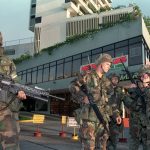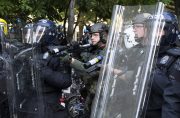PHR led an investigation into violations of human rights and medical neutrality in Panama following civilian unrest in June and July of 1987 which included street riots and violence. The tension followed reports that Panamanian leader General Manuel Antonio Noriega had been involved in electoral fraud, corruption, and even political murder. Protesters burned down commercial properties and took to the streets to rally for change.
The unrest resulted in a state of emergency being imposed on June 11th.
In July, university students were wounded by gunfire as police sought to suppress the anti-government protests at the University of Panama. University authorities, fearing more unrest, closed the campus for a period of time.
The U.S. State Department also temporarily closed the American consulate and a library operated by the United States Information Service fearing that the locations were unprotected against protesters because the local police had withdrawn from the area.
PHR’s report, “Panama 1987: Health Consequences of Police and Military Actions,” looked at the use of force by police and at the health consequences of armed action by law enforcement officers. The report found that security forces had used bird shot and tear gas against protesters and interfered with medical care delivery to civilians, and that the government had impeded the right to freedom of expression by health professionals.
PHR’s report, “Operation ‘Just Cause:’ The Human Cost of Military Action in Panama,” found that the number of Panamanian civilian deaths incurred during the U.S. invasion of Panama in 1989 greatly outweighed the total number of military deaths, debunking the figures provided by both the U.S and Panamanian governments.



